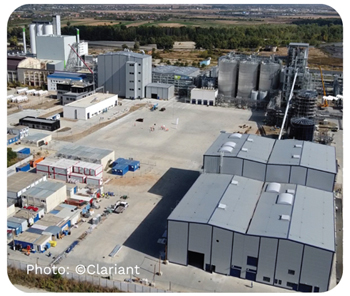 Fighting climate change is one of the European Union's most urgent goals. With the European Climate Law as part of the European Green Deal, the EU has set itself the ambitious objective of becoming climate neutral by 2050. As the transport sector is responsible for 25% of the EU's total greenhouse gas emissions (GHG), it has to make a major contribution and reduce its GHG emissions by 90% by this date.
Fighting climate change is one of the European Union's most urgent goals. With the European Climate Law as part of the European Green Deal, the EU has set itself the ambitious objective of becoming climate neutral by 2050. As the transport sector is responsible for 25% of the EU's total greenhouse gas emissions (GHG), it has to make a major contribution and reduce its GHG emissions by 90% by this date.
Undoubtedly, electrification will play a major role in decarbonizing the transport sector. Even though the sales of electric vehicles are constantly growing in the EU, petrol driven cars were still accounting for more than 50% of new passenger vehicle sales in August 20211. Therefore, to deliver results quickly, a broad portfolio of sustainable solutions and advanced technologies is necessary to make these petrol driven cars greener.
Sunliquid® – competitive and sustainable cellulosic ethanol
Clariant's sunliquid® technology is such a solution. It turns agricultural residues such as cereal straw, corn stover or sugarcane bagasse into cellulosic ethanol. Cellulosic ethanol is an advanced, truly sustainable biofuel that contributes to a climate-neutral Europe based on sustainability and circularity. Today, cellulosic ethanol is used as a dropin in conventional fuels in cars and in heavy road transport. It offers further downstream application opportunities for sustainable aviation fuel, an area that is difficult to electrify in the short term.
"There is no one single solution for the transport sector to substantial CO2 emission reductions. Carbon neutral solutions like sustainable, advanced biofuels do exist for the fueling infrastructure. What we need are long-term policy continuity and regulatory predictability for investors to make Europe's vision of a climate neutral environment a reality," said Christian Librera, Vice President and Head of Business Line Biofuels & Derivatives at Clariant.
Swiss company Clariant, a leading producer of specialty chemicals, has recently completed the construction of the first commercial-scale plant for the production of cellulosic ethanol based on the sunliquid® technology. The plant is located in Podari near Craiova in the south-west of Romania. 250,000 tons of straw will be processed annually in the plant to produce 50,000 tons of cellulosic ethanol. The use of agricultural residues in the immediate vicinity promotes local fuel production and maximizes GHG reduction. Coproducts resulting from the process will be used for the generation of renewable energy, making the plant highly sustainable and energetically neutral. The production of sunliquid® cellulosic ethanol leads to a CO2 reduction of up to 95% compared to fossil fuels. Furthermore, it creates green jobs and economic growth in predominantly rural areas. There are currently 75 staff members employed in the plant, and contracts with more than 300 local farmers have been signed to ensure the supply of the necessary feedstock.
Clariant is investing more than €100 million in its first-of-its-kind cellulosic ethanol plant. The project receives a funding of €48 million from the European Union. So far, fi ve sunliquid® technology licenses have been sold in Europe and China.
Contact details
Dr. Christian Librera, Vice President and Head of Business Line
Biofuels & Derivatives
Clariant Produkte (Deutschland) GmbH
Tel: +49 (0)89 710 661 0
Email: contact@lignofl ag-project.eu
Website: www.lignoflag-project.eu
This project has received funding from the Bio-based Industries Joint Undertaking (JU) under the European Union's Horizon 2020 research and innovation programme under grant agreement No 709606. The JU receives support from the European Union's Horizon 2020 research and innovation programme and the Bio-based Industries Consortium.